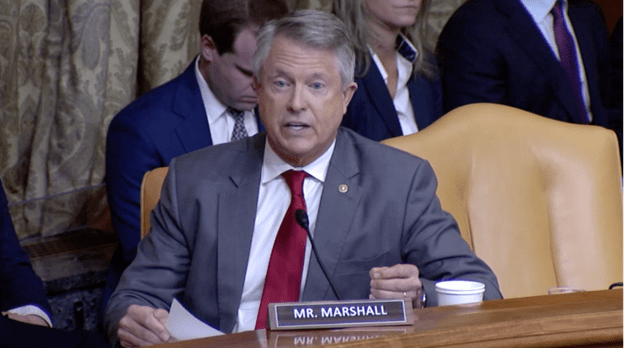In a tense exchange that has sent shockwaves through political and social circles, Sen. Roger Marshall (R-KS) fiercely questioned President Joe Biden’s pick for the National Institute of Health (NIH) directorship, shining a spotlight on the contentious issue of taxpayer-funded “gender-affirming care.” This category of medical intervention, widely debated and discussed in platforms like Townhall, includes treatments such as puberty blockers, hormone therapies, and sex reassignment surgeries — all irreversible and, at times, experimental.
Marshall posed a provocative query, questioning the ethicality of allocating taxpayer money for what he termed “cosmetic” gender reassignment research, which involves the destruction of healthy tissues and organs. He voiced deep concern over off-label usage of FDA-approved products, resulting in irreversible, detrimental effects, stressing that such uses don’t address diseases or illnesses.
“Is it justifiable to allocate taxpayer dollars for research into these irreversible, alarming procedures and hormone applications that deviate from their approved uses?” Marshall demanded, emphasizing the irreversible nature of these procedures.
To answer the question – the NIH should NOT use tax-payer dollars to do research OR fund irreversible gender-transition mutilation procedures on minors. pic.twitter.com/CaOkS6I5gy
— Dr. Roger Marshall (@RogerMarshallMD) October 18, 2023
Responding, nominee Bertagnolli acknowledged their mutual concern for the LGBTQ community’s welfare, particularly the younger, more susceptible members. “If confirmed,” Bertagnolli pledged, “my leadership will ensure the NIH pursues research dedicated to optimizing health outcomes for these individuals, who deserve our utmost care and concern.”
However, Marshall persisted, seeking clarity on Bertagnolli’s stance regarding funding research that could permanently alter the lives of young individuals undergoing such treatments. “Can you endorse research that potentially causes irreversible harm to these young boys and girls, barely in their teens? Will you finance such studies?”
Bertagnolli countered, asserting any human-subject research under NIH purview must adhere to stringent ethical standards, ensuring no harm and maximizing benefits for participants.
Adding fuel to this fiery debate is the heart-wrenching story of 19-year-old Chloe Cole, who publicly declared her intention to sue the entities and physicians responsible for her irreversible procedures received as a minor, including a double mastectomy at the tender age of 15, a decision she regretted just a year later.
Cole’s experience underscores the intense emotional and physical toll of such early-life decisions. “My adolescent years were a storm of agony, remorse, and, above all, unfairness,” she disclosed. “While I can’t reclaim what I’ve lost, I’m determined to fight so no other child suffers at the hands of these deceivers and abusers. I’m taking these perpetrators to court.”
This ongoing debate, spotlighted by Senator Marshall’s piercing questions, continues to ignite discussions on the national stage, questioning the morality, ethics, and financial implications of funding irreversible medical interventions in the transgender community.

















